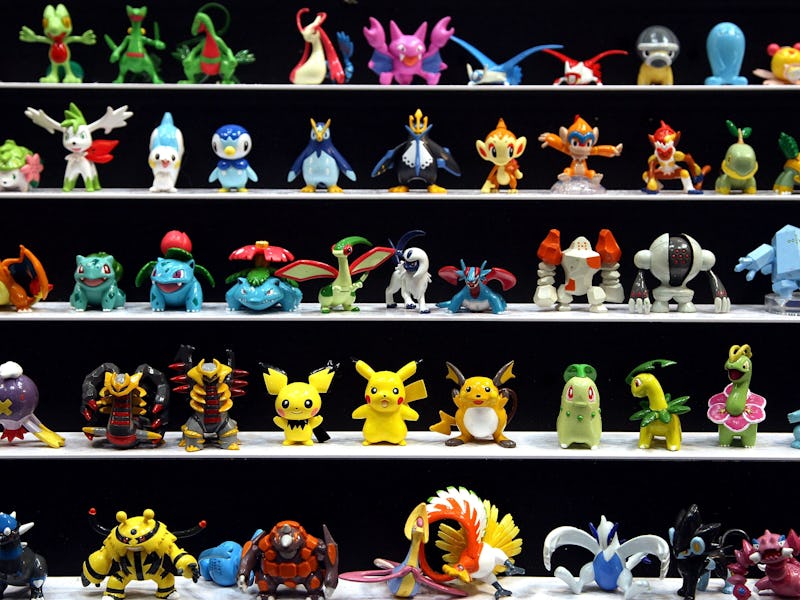The Brief Life and Death of 'Pokemon Uranium'
After nine years of work, Pokemon's most ambitious fan-created game yet is all but gone.

The fan-made Pokémon Uranium was released for Windows PC by developers JV and Involuntary Twitch last week after over nine years of development. The game is basically built from scratch using the scaffolding of the official games, and offered dozens of new critters to catch. But don’t get too excited — it’s already gone.
Such is the fate of many fan creations, including the recent fates of projects paying homage to Metroid and Star Wars. All were ultimately brought down by a strongly worded Cease and Desist from the parent company of those franchises. The Pokémon Uranium developers were slapped on the wrist by Nintendo after the August 6 launch, but not before the game was downloaded 1.5 million times. It featured 150 new Pokémon, and was modeled after the Game Boy classics.
“While we have not personally been contacted, it’s clear what [Nintendo’s] wishes are, and we respect those wishes deeply,” the developers announced on their website less than a week after the free game was launched. For those who did manage to download it, support will still be available.
JV and Involuntary Twitch find themselves in the same position as many others, whether it be a humble fan-made game or the likes of The Beatles and Stones. Toeing the line between influence and homage can be extremely tricky. That doesn’t mean it can’t be done — the Skywind modding project is a great example — but more often than not, impressive products like Pokémon Uranium are ultimately buried because they mirror the source material too closely.
Here’s Pokemon Uranium, for example:
Insanely cool? Yes. Exactly like the Game Boy you snuck into the handicapped bathroom to play without volume in the third grade? Yes, and while it taps into the totally ‘90s vibe it’s after, this is a real problem, particularly at a time when Nintendo is trying to push Pokémon Go into the wearable technology and paid game atmosphere.
But does cost factor into it? The creators of the game make it clear they’re not profiting in the first frame of the game trailer. Plus, Pokémon Uranium takes place in an entirely new environment called Tandor.
Sorry, no dice. As fun as it is to demonize the big companies for laying down the law with fan games, any intellectual property lawyer will tell you that it’s a necessary caution to protect a brand as huge as Pokémon — particularly if the fan game attracts as much attention as Uranium did — regardless of whether it’s not for profit.
“If a company was to continually ignore infringements of a trade mark, the protection afforded by the mark is eroded and may render it invalid,” Alex Tutty, an IP media strategist, told Wired during a different Nintendo squash of a Pokémon fan game in 2011. “Once the infringement of IP is ignored it becomes increasingly hard to recover lost ground.” That is to say, if Nintendo doesn’t take every threat to the brand seriously, no matter how well-intentioned and adoring, it could weaken a case in court if the IP is ripped off in a significant way down the line.
Meanwhile, the Pokémon Uranium creators have maintained a c’est la vie attitude in the face of the removal.
“It’s a misconception that most fan games get shut down,” Involuntary Twitch, who has been working on the game with other developers since her freshman year of high school, explained to Nintendo News. “The reality is there is just a few high-profile news stories about ones that do. Meanwhile, there are dozens of fan projects just like ours that have been operating under the radar for years.”
Some of Pokemon Uranium's original offerings.
So is there any hope for those of us hoping to make one of those weird one-offs where you give Sonic the Hedgehog a complicated dental surgery? Here’s a few things to keep in mind to avoid the fate of so many others:
Be inspired, not copy and pasted. While recreating the same gameplay and interface as the source material looks and feels cool, it’s a fast track to getting a Cease and Desist.
Remember: Everything in a game is copyrighted. Try as you might to alter names, tweak stories, and sketch in your own environments, something as simple as a ripped sound cue can put a piece of fan art into serious hot water.
Just ask. Okay, it sounds too easy to be true, but if a parent company thinks they can leverage your product to boost sales of their own, this can work out very well (Skywind is, again, a great example.)
Creating a fan game can be fulfilling in a number of ways — it’s a great way for burgeoning developers to learn and create within the bounds of a fictional world they already know instead of starting from scratch, it can build community, and a million other reasons. What a fan-game developer shouldn’t expect, unfortunately, is that it will be around for too terribly long if discovered.
Rest in peace, Pokémon Uranium, and here’s to your chillness in the face of adversity.